After staying at home for a month, while the whole people were fighting the epidemic, the government rent free, increasing revenue and reducing expenditure, many netizens, including Xu Hui, received a notice of rent increase. The price of the comfortable apartment they rented increased to varying degrees when the contract was renewed, ranging from tens of yuan to hundreds of yuan. Many tenants reported that the reason given by the housekeeper was to make more money for the landlord, and the company system set a 10% increase. However, there was no more information on the landlord side, and the 10% increase fell into the landlord's pocket.
The epidemic has just slowed down, and the market is yet to recover. Is it because of the pressure of the landlord to increase the price, or because the platform has other considerations? Who is going against the market to increase the rent under the epidemic? Why can the proposed increase be cut through price reduction? Can the 10% setting really gain market support and meet the regulatory red line?
10% increase is "system setting"
If the tenant wants to leave, he will give a discount
According to the public information, Zixiang is a technology company that provides high-quality residential products and life services. At present, it has been deployed in 10 cities, with about 20000 service providers and nearly 500000 owners and 5million Zixiang customers. With high-quality service, freedom was once favored by many young people.

At the beginning of this year, Xuhui sublet one of the free three bedroom apartments from a friend. At that time, the remaining lease period was half a year, and the rent was 3000 yuan / month. Because he was afraid of trouble, he was hard enough to talk to his friends. Xuhui did not change the bottom order, as the free housekeeper knew.
"At that time, my friend renewed the rent for two years. The monthly rent increased by 40 yuan in the first year and 60 yuan in the second year. Before I moved there, I asked the housekeeper, and the reply was' the price increase is positive, generally controlled at 3% '." At that time, the housekeeper also said that compared with the cost of moving, the 3% increase was the cost of long-term apartment operators to resist inflation, which Xu Hui also recognized.
Seeing that the house expired in June, Xu Hui proposed to renew the contract with the housekeeper because of the epidemic situation and the fact that the two roommates living together were good. "Considering the epidemic situation, it is impossible to raise prices this year." Reality gives Xuhui a loud slap in the face - the rent rises by 320 yuan a month.
Xuhui calculated the account. According to the previous monthly rent, his one-year rent plus one-month rent standard service fee, excluding water, electricity and heat, his rental cost is 39000 yuan a year. If according to the standard after the price increase given by the intermediary, his one-year rental cost rises to 43160 yuan, an increase of nearly 11%.
"At that time, I asked the housekeeper if he took advantage of the situation. Under the epidemic, state-owned enterprises are reducing rent, and the government is also providing various subsidies. We understand that long-term apartment renting has costs, but we can't increase it by more than 10% at one go." After a furious interview with the housekeeper, Xu Hui got a reply: "it's no use telling me. This is the company's system setting. The 10% standard can't be changed."
After the complaint failed, Xu Hui planned to move and entrusted another parent to rent the house. When he told the housekeeper of his intention to move and choose another brand, the housekeeper immediately told him that he had applied for a special discount - an increase of only 70 yuan. "From 320 yuan to 70 yuan, this is not a small amount. I just want to know if I will be cheated if I don't make trouble."
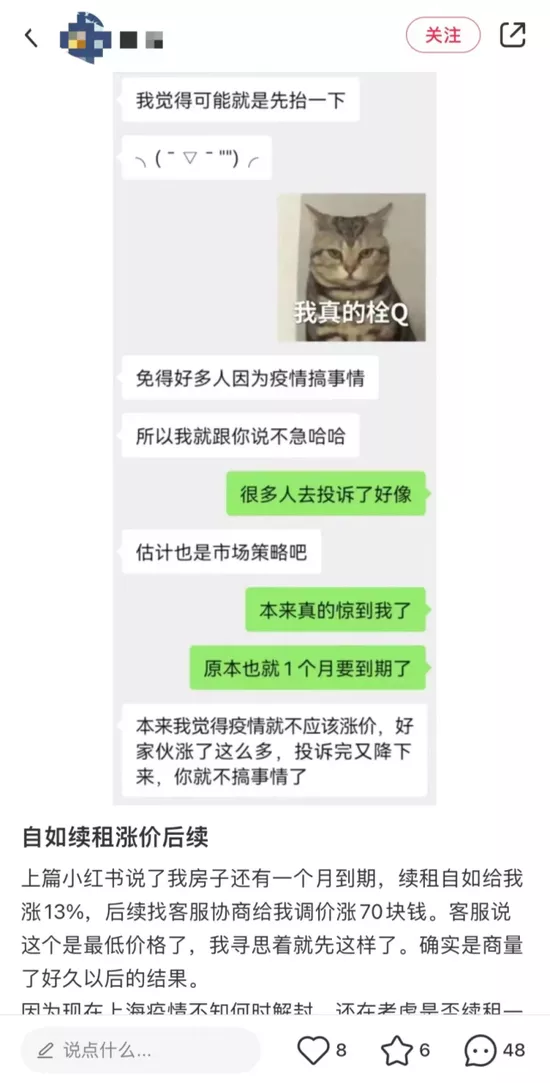
Increase the price because you have to pay more to the landlord
Industry: double digit increase "unlikely"
Under the epidemic, this is not the only one who has raised the price of long-term apartments against the market.
The reporter searched for the keyword "rental price rise" on a social platform and found that there were not a few netizens who had similar experience with Xu Hui. The price rise ranged from tens of yuan to hundreds of yuan. Not only in Beijing, but also in Shanghai, which has been closed for more than two months. Some of them renewed the contract after negotiation with the housekeeper, while others said they could not accept the price increase and chose to quit the lease.
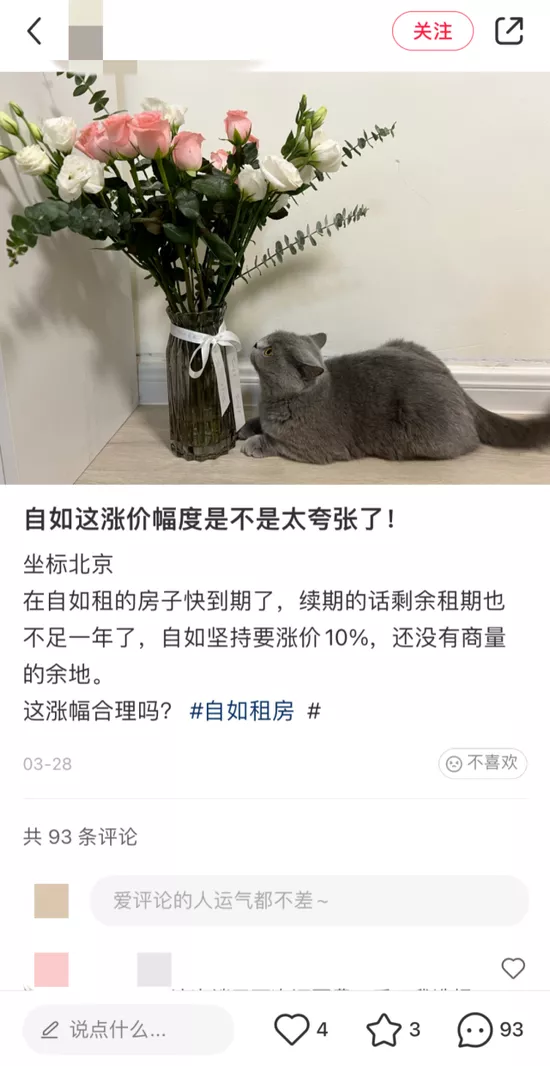
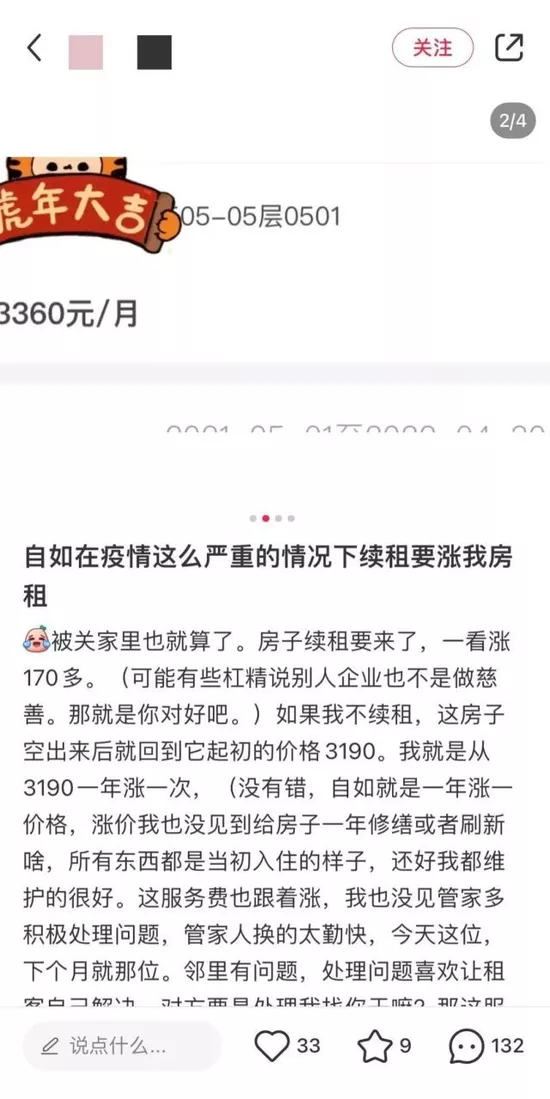
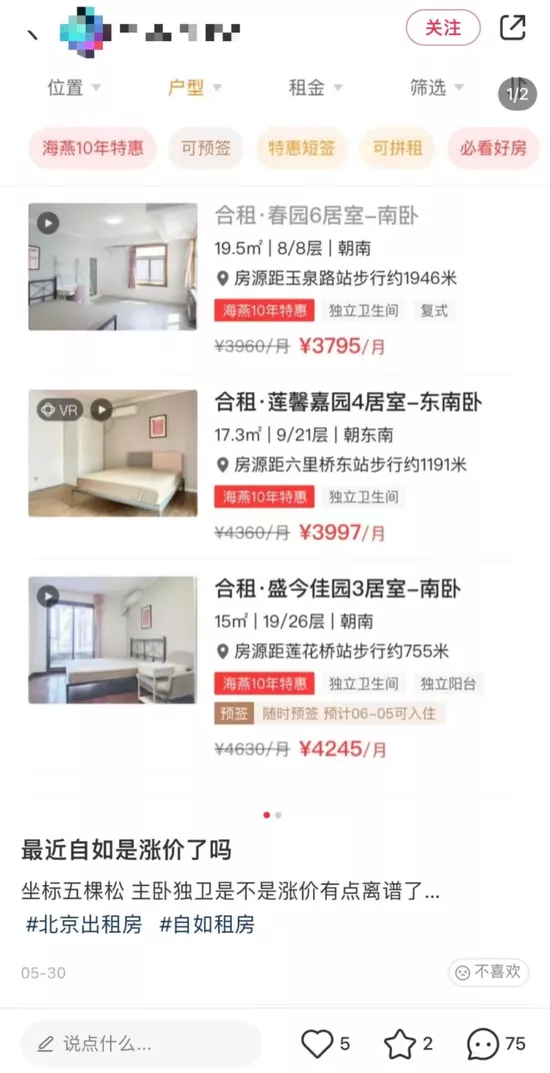
The reason why the tenant mentioned the housekeeper's reply to the price increase was that he and Xu Hui met the same reply - system setting. According to the feedback from the tenants, the 10% increase is a proportion of most of the posts about the price increase of long-term rental apartments in roast. The final result basically depends on the market trend, the game with long-term rental brands and whether we can find a "spare tire".

Source: provided by the interviewee
However, many renters, including Xu Hui, have questioned whether the rental market in Beijing has quickly returned to the normal level in the peak rental season after the current outbreak?
In this regard, in an interview with the reporter of Beijing business daily, Xu Hui said that the company would make reference to various factors such as housing source location, market price trend and product configuration, and make dynamic adjustments, with ups and downs varying. In addition, according to the entrustment contract between the company and the owner, the annual rent paid to the owner will also rise according to a certain proportion.
"If it is a trusteeship house, especially one that needs to be reinstalled, some long-term contracts do give the landlord a certain increase every year, but the average range is unlikely to be in the double digits." The head of a long-term rental apartment said frankly that even if there is an increase, the increase of long-term rental apartments to landlords is a fixed figure, and it is impossible to see such a situation as 60 yuan last year and 320 yuan this year.
Cold market
If the trading volume is not good, how can we find profits for a single set
The information from the market level can not support the sharp rise in rent caused by the "market price trend".
According to the data of the shell Research Institute, in May, the rent level of 40 key cities in China fell slightly month on month. Nearly 70% of the cities' rents fell year on year, with the rent level of 34.0 yuan / square meter. The rent index fell slightly by 0.7% month on month and 2.3% year on year. The average price of newly listed houses was 37.9 yuan / square meter, a slight decrease of 1.3% month on month, a year-on-year decrease of 2.9%, and a decrease of 9.0% compared with the same period in 2019.
From the perspective of city level rent index, among the 40 key cities in China, the rent level of 20 cities fell slightly month on month in May, 27 cities fell slightly year on year, and the rent of 34 cities was still lower than that of the same period in 2019, among which the rent of first tier cities Beijing, Guangzhou and Shenzhen was lower than that of the same period in 2019.
The market is generally cold.
"It is certainly not normal for the epidemic situation to rise against the market." Yanyuejin, research director of the think tank center of E-House Research Institute, said that in theory, the economic environment is bad, and the rental market should also be bad. On the contrary, long-term rental apartments are under great pressure, and the cost of some rental houses will be transferred to the rise of rent if they are not rented out. Therefore, this problem also needs more attention from the market and the government, which can not only make tenants no longer feel the rise of rent, but also reduce the cost of enterprises.
Liangnan, an analyst at Zhuge housing search data research center, also analyzed this. On the one hand, due to the changes in the market rent price under the epidemic, the landlord raised the price, which forced the price of long-term apartments to rise to ensure the profitability of the enterprise; On the other hand, long-term apartments usually sign a large number of houses at the end of last year and are ready to be rented after the year. However, under the influence of the epidemic, the houses cannot be rented in time, and the long-term apartments will face certain losses. To a certain extent, they will choose to increase the price to reduce the losses.
In this regard, the rental rate of Beijing and Shanghai given by the free side is 90%.
Regulated 5% red line
Another reason why both the market and renters cannot accept double-digit rent increases is regulatory considerations.
During the current round of epidemic, the Beijing housing lease regulations, which lasted for eight years, was finally released, comprehensively regulating the leasing market from the aspects of insisting on both leasing and purchasing, protecting the leasing relationship, standardizing the leasing market and protecting the rights and interests of the people. The first local laws and regulations have been formulated for the rental groups with a large base in Beijing.
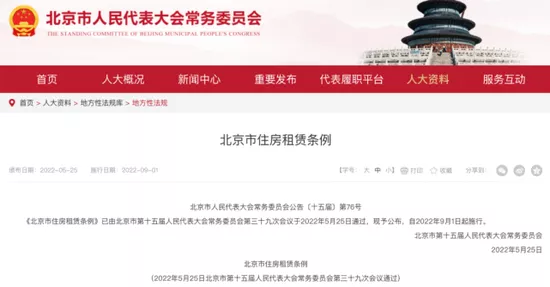
Liang Nan said frankly that the price increase in Beijing's rental market has set a red line, stipulating that "the annual increase in urban housing rent shall not exceed 5%". Based on this, the proportion of automatic price increase for renewal of long-term rental apartment platforms is set at 10%. On the one hand, enterprises have reserved a certain profit space, on the other hand, the proportion limit will not increase the rent increase too much, which is conducive to ensuring that many young people live in, At the same time, it is also conducive to avoiding the market chaos of some long-term apartment enterprises raising rents indiscriminately, so as to promote the healthy and stable development of the rental market.
"This kind of price increase has already appeared two years ago. Under the pressure of the epidemic, if it were not for the government's control, it might have risen even more fiercely." Yan Yuejin also said that the government generally sets the increase rate at 5%, but in some places, it may be adjusted once a year. There is a 10% increase level.
Reporter Lu Yang intern reporter sunyongzhi